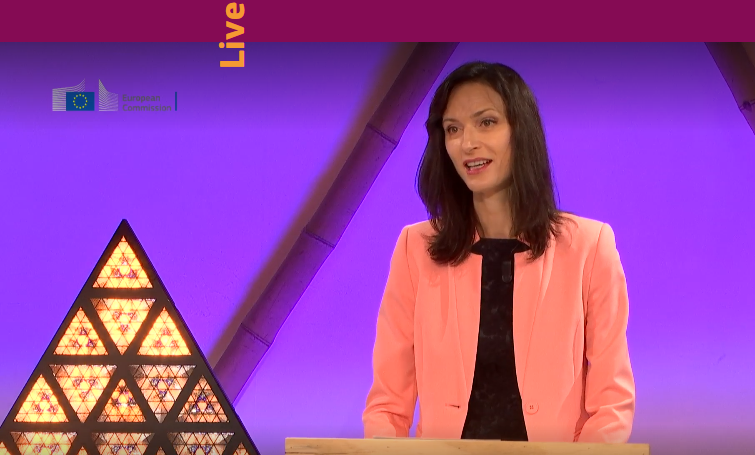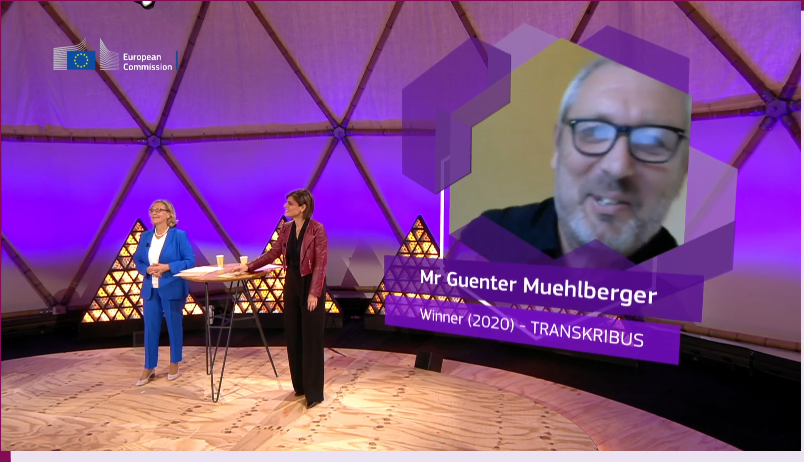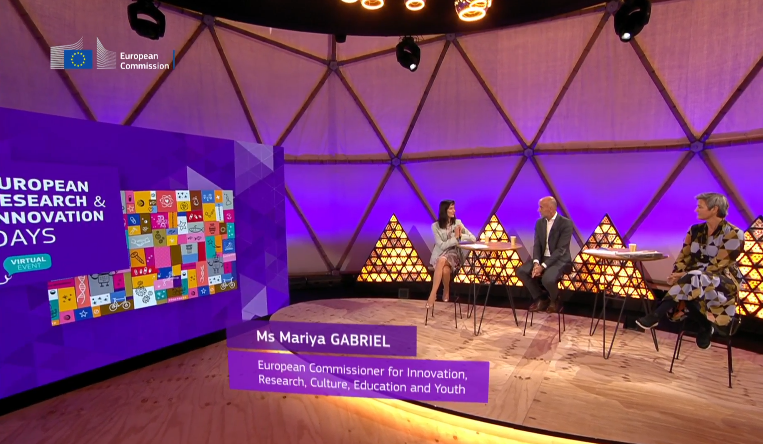Plenary
22.09.2020

Welcome by Commissioner Mariya Gabriel
In her welcoming speech during the opening ceremony, Commissioner Mariya Gabriel (EC for Innovation, Research, Culture, Education and Youth) stressed that the R&I Days are not only an information event but also a call for action to all participants to contribute to make things change. Anja Karliczeck, German Minster of Education and Research, welcomed participants on behalf of the current Council Presidency. She underlined that the European R&I system is a global leader and is currently playing a key role in combating the COVID-19 crisis. MEP Christian-Silviu Busoi, Chair of the ITRE Committee representing the European Parliament, emphasised that Europe’s future depends on R&I and the European Parliament is fighting hard to increase the Budget of Horizon Europe.
The European R&I missions are not only a key feature of Horizon Europe, but also connect research and innovation with public policy. They demonstrate that Europe can act on key challenges like cancer, climate change, soil, water and cities. After a year’s work, the five mission boards presented their mission reports, including recommendations and roadmaps, to the European Commission. In response to the presentation of the mission reports, the Commissioners for Health & Food, for Agriculture and for Environment, Oceans and Fisheries reflected on how the missions relate to current policy developments and how they can be turned into reality. The efforts to involve citizens, patients, consumers and to follow an inclusive approach in the identification of priorities were appreciated by all Commissioners. Finally, the synergies between the missions were highlighted: They require cross-policy action also for the implementation. The mission reports are available at the Commission’s website.
During the panel discussion on the European Green Deal and the Just Transition, there was consensus among the panelists that Europe is in a decisive moment in time: A multitude of crises (global pandemic, climate crisis, biodiversity loss) unfolds in a time of quickly changing geopolitics and in the midst of an industrial revolution. R&I are at the heart of addressing these challenges. The success of Horizon Europe and the Green Deal is determined by inclusivity. High-tech must be accessible and understandable for the vast majority of people and they need the know-how to apply high-tech. We must facilitate a fair transition, otherwise polarization in Europe will increase even further.
The afternoon session on the new European Research Area, focused on the upcoming Communication on the European Research Area (ERA), soon to be released by the European Commission. The main novelties of the Communication took center stage, in particular the aim to build an excellent European R&I system for the benefit of all, and its aim for a wide outreach, engaging Member States, regions and citizens. The Ministers of the Trio-Presidency from Germany, Portugal and Slovenia, as well as the current and former Presidents of the Committee of the Regions reacted to the presentation of the cornerstones of the ERA that Commissioner Gabriel summed up as the:
- 3 Is: Ideas | Infrastructures | Impact
- 3 Ps: People | Planet | Prosperity
- 3 Cs: Curiosity | Citizens | Collaboration
23.09.2020

Günter Mühlberger, Horizon Impact Award Winner
The plenary started with celebrations:
- First, Horizon 2020-funded research projects that have “used their results to provide value for society“ were in the spotlight of the Horizon Impact Award Ceremony.
The five awarded teams, receiving EUR 10,000 each, addressed topics as diverse as using AI to analyse historical documents (Transkribus – Günter Mühlberger and Andy Stauder, Austria), transparent electronic displays (Invisible – Elvira Fortunato, Portugal), fighting illegal fishing (Ocean Sentinel – Henri Weimerskirch, France), an easy-to-carry device providing mobility and independence to children with heart failure (MACH – Carine Bernström, Germany) and an ‘eco-software’ to reduce the carbon footprint of aeroplanes by reducing their fuel consumption (CARING – Alexandre Feray and Solveig Moisan, France). - The next celebration followed suit: Opening the prize ceremony for women innovators, Commissioner Mariya Gabriel emphasized that this ceremony is also “a place to show women role models for our girls and for our society and to unlock the unbelievable potential of girls and women”.
The first prize category awarded was the Rising Innovator Prize. Two women received special mentions: Ailbhe Keane (Ireland), founder and creative director of Izzy Wheels, whose company creates fashionable wheel covers for wheelchairs, and Rebecca Saive (Netherlands), co-founder and CTO of ETC Solar. Her company is developing a micro metal 3D printing tool to enable performance enhancement of solar cells.
The Winner of the Rising Innovator Prize 2020, awarded with EUR 50,000, is Josefien Groot (Netherlands), co-founder and CEO of Qlayers. Her company designs microstructures to boost the efficiency of wind turbines.
For the main category, finalist Cécile Real (France), co-founder and CTO of Endodiag, received a special mention. Her company develops early diagnosis solutions for endometriosis, a disease affecting 180 million women worldwide.
Three winners, receiving EUR 100,000, were announced: Madiha Derouazim, CEO of Amal Therapeutic, works on a cancer vaccine platform. Maria Fatima Lucas, CEO and Cofunder of Zymvol, was recognized for her achievements in disovery and optimization of new industrial enzymes. Arancha Martinez developed a biometrical tool supporting the coordinated efforts of NGOs attending to street children. Commissioner Mariya Gabriel and Jean David Malo, Director of the European Innovation Council (EIC) task force, thanked the winners for their energy and their inspiring work.
The ensuing two sessions had a common theme: “Advancing together“. First, a panel composed of Jana Kolar (moderator, Executive Director CERIC-ERIC), Oliver Varhelyi (Commissioner for Neighbourhood and Enlargement), Paulo Ferraho (President of COST) and Indrek Reimand (Deputy Secretary General at the Estonian Ministry of Higher Education and Research), debated the ambition to combine “excellence and inclusiveness“ in a “widening strategy to advance Europe together“. The discussion was framed by an introductionary statement by the Commissioner for Research and Innovation, Mariya Gabriel, who presented the cornerstones of the Commission’s Widening 2.0 strategy. She emphasized that “excellence will always stay at the core of our policy, but we need to provide access to excellence, to build strong collaborations“. The ambition of the strategy was to identify main challenges and concrete intstruments to provide solutions, also by synergies between Horizon Europe and other funds – with the aim to „give a chance to all our talents, in their countries and their regions“. This approach was echoed by Oliver Varhelyi, who highlighted the intensified efforts to support the Western Balkan and Eastern European countries in their efforts to counteract brain drain and making their economies more resilient. Paul Ferraho highlighted the achievements by the Cooperation in Science and Technology (COST) actions, wich support integration in European and global networks. Indrek Reimand emphasized that “widening is a tool, not an end in itself – it should be a tool to exit the widening class; we should talk more of exit strategies“. In a concluding statement, Mariya Gabriel underlined that the idea is “not to retain researchers, but to give them the option to stay – respecting the own choices of researchers“. Researchers should have clear idea of their career perspectives – which is often not the case now.
The next panel under the “Advancing together“-umbrella discussed strategies for an “all-inclusive recovery for a stronger Europe“. The moderator, Maria Demertzis (Deputy Director of the Brussels-base economic think tank Breugel), was joined by Sandrine Dixon-Decleve (Co-President Club of Rome), Carlota Perez (University of Sussex), Stephanie Kelton (Stony Brook University), Mariana Mazzucato (UCL), and Kate Raworth (Oxford University). During the animated discussion, the panel heard that some governments proved much more resilient during the Covid-19 crisis, because they applied well-being indicators or societal indicators rather than the traditional GDP-based indicators. Confidence was expressed that “we can apply new economic models to keep within our planetary boundaries“. With reference to the recent State of the Union speech by European Commission President Ursula von der Leyen, it was maintained that “there is an incredible signal of leadership that Europe has in this area now“. Recognising that whole branches of jobs are destroyed by the ongoing transformation, it was also emphasized that changes towards a “green life style“ can create new jobs, paving the way for another, maybe “European“ way of life. The important role of fiscal policies in this context was underlined, as was the need for a more active, purpose-driven role of governments.
The day was concluded by a multi-faceted discussion of Nobel & Kavli Prize laureates, Jennifer Doudna, Christopher Pissarides, Peter Ratcliffe and Ewine van Dishoeck, on “blue sky research to prepare for an uncertain future“. A particular emphasis was put on the societal importance of education, for a better understanding of how scientists derive their findings – „teaching history through science, and science through history“.
24.09.2020

Closing ceremony of the European R&I Days
This day commenced with the Prize Ceremony for the European Innovation Council (EIC) Horizon Prize for Affordable High-Tech on Humanitarian Aid. The EIC prize rewards high-tech innovations that meet the needs of most vulnerable people around the world. The aim is to bring such innovations to the world, demonstrating that high-tech solutions can be applied in an affordable and inclusive manner and improve quality of life of refugees, disabled people and society at large. The prize is awarded in five categories, not limited to European organisations.
- The winner in Category 1 Shelter and Related Assistance is the South African SME Lumkani that developed a sensor-based, low-cost solution to mitigate loss of lives and property through fire.
- In Category 2 Water, Sanitation and Hygiene, the UNHCR was recognized for its real-time solution for water tanker monitoring to improve the effectiveness of water trucking programming and ensure fast water supply for refugees.
- The Norwegian SME BRIGHT Products won the prize in Category 3 Energy for affordable and recyclable mobile phone charging that brings light and communication to people who have no access to infrastructure.
- The prizes in Category 4 Health & Medical Care and Category 5 Open Category both went to Handicap International, a French non-profit organisation. With their high-quality digital 3D scanning and printing technology TeReFa, which provides people in remote areas with affordable access to prostheses, they won the Category 4 award. In addition, the project Odyssey2025 that works towards the goal of a mine-free world in 2025 by using drones for efficient and safe release in mine clearance was the winner of the Open Category.
Next, the six finalists in the European Capital for Innovation Awards, namely Espo, Leuven, Cjue-Napoca, Vienna, Valencia and Helsingborg, briefly presented their innovative city strategies. EU Commissioner Mariya Gabriel announced the winner Leuven, endowed with EUR 1 Mio. cash as the European city which was best able to demonstrate its ability to harness innovation to improve the lives of its citizens. The five runners up were each awarded with EUR 100,000.
Moving from cities to the entire European Research Area (ERA), the ensuing session focused on how to strengthen synergies between the European Education Area (EEE) and ERA. A panel assembled Commissioner Mariya Gabriel, Maria da Graça Carvalho (European Parliament/ITRE), Jean-Marc Ogier (President of University La Rochelle), Sari Lindblom (Vice Rector of the University of Helsinki) and Hrvoje Meštrić (Ministry of Science, Education and Sports, Croatia, Director of Department of Science), moderated by Gareth O'Neill (Technopolis). The European Universities initiative was frequently a topic of discussion, for instance as a symbol that “after 20 years of parallelism of Bologna and ERA“ they finally found together in the Call for European Universities. The need for a European accreditation system, acoompanied by a legal entity to offer degrees, was emphasized. In her concluding statement Mariya Gabriel expressed her ambition that “the beautiful word ‘synergy‘ will be translated into something concrete“, also in view of the impetus that has been created by the 41 European University alliances. She also pointed out the important role of regions in this process and the interest expressed by the Comittee of the Regions in building synergies between ERA and EEA.
While the COVID-19-pandemic also left its traces in the debate on these synergies, it took center stage in the next session titled „COVID-19 Response: the EC making a difference and acting globally“. It highlighted initiatives and ongoing actions at EC level to address the pandemic, including through global cooperation. In her introductory statement, Irene Norstedt (EC) reported that we have by today almost 32 Mio. cases worldwide, almost 1 Mio. have lost their lives, and we see dramatic effects on economy, mental health and many others issues. The Commissioner, Mariya Gabriel, summarized the efforts by the EC in the last months since the beginning of the crisis. More than ever has been done in research and innovation, with an extraordinary level of cooperation. This included
- the ERAvsCorona Action plan that was launched with the Member states within 30 days,
- a data platform, which had more than 2.7 million requests for data in these last months,
- a “Hackathon” with 21,000 participants and 2,000 solutions.
European leadership in global coordination was demonstrated, for instance by organising the first pledging conference with a final result of EUR 16 Billion. Soumya Swaminathan, Chief Scientist at the WHO, gave her view of the current situation. Less than 10% worldwide have had the infection, we are all still susceptible. Solutions will come from science. Peter Piot (Director of London School of Hygiene and Tropical Medicine, Special advisor to Ursula von der Leyen) spoke on progress, challenges and outlook. Data is being shared much more than in the past, and there is great progress in open science. Realistically the pandemic will be with us for a long time, therefore R&I also has to deal with long term perspectives. Vaccines are essential for managing the crisis, but will not end the pandemic and are not the silver bullet. We also need to continue on non-medical interventions and on social sciences studies. The EC has done a lot, but needs to do more, namely strengthen capacity in Europe for manufacturing and stockpiling, and better coordinate and manage trials. It is also important to step up international cooperation. We need to plan for future societies living with Covid-19, which requires an agenda on mental health, inequality, urban health and a connection of all agendas on European level with the pandemic (e.g. Green Agenda and Digital Agenda). We need to become more resilient and better prepared.
The next session brought a new twist to the theme “when policy meets science”, in a conversation with an astronaut: Jean-Eric Paquet discussed with European Astronaut Samantha Cristoforetti, who became a cult figure during her time in space. Jean-Eric Paquet stressed how inspiring space missions can be and talked about the huge importance of collaboration on space missions. He highlighted that collaboration is the DNA of European research and that the “best” science is collaborative science. This strength is also something that will be fostered and nurtured with the new European research programme, Horizon Europe. Samantha Cristoforetti shared her experiences with outreach via social media and how the exchanges with European citizens inspired her work. These media allowed her to take people along her mission and it was great to see how people were inspired and continued to tell the story of her mission in form of for example podcasts. Jean-Eric Paquet emphasized that this inclusion of citizens will be part of Horizon Europe. Samantha Cristoforetti also reflected on how Europe looks from above – very bright but also with a distinct fragmented shape. Furthermore, she talked about being inspired by getting to see our shared planet from above, underlining the importance of protecting earth and its climate.
The plenary was concluded by a round of closing remarks that also wrapped up some statistics of the R&I Days 2020: 576 speakers, 146 sessions and more than 35,000 participants from 143 countries.
Kontakt

